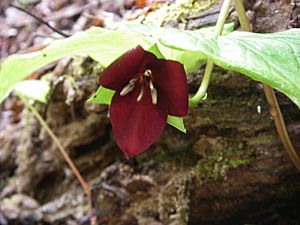Sweet wakerobin facts for kids
Quick facts for kids Sweet wakerobin |
|
|---|---|
 |
|
| Great Smoky Mountains National Park, Tennessee | |
| Conservation status | |
| Scientific classification |
|
| Kingdom: | Plantae |
| Clade: | Tracheophytes |
| Clade: | Angiosperms |
| Clade: | Monocots |
| Order: | Liliales |
| Family: | Melanthiaceae |
| Genus: | Trillium |
| Species: |
T. vaseyi
|
| Binomial name | |
| Trillium vaseyi Harb., 1901
|
|
| Script error: The function "autoWithCaption" does not exist. | |
| Synonyms | |
|
|
Script error: No such module "Check for conflicting parameters".
The Trillium vaseyi, also known as the sweet wakerobin or sweet beth, is a beautiful plant that blooms in spring. It's a type of plant that comes back year after year. You can find it mostly in the southeastern United States. It grows mainly in the southern parts of the Appalachian Mountains. A few groups of these plants can also be found a bit farther south.
Contents
What is the Sweet Wakerobin?
The sweet wakerobin is known for having some of the biggest flowers in the trillium family. Its petals are usually red and can grow up to about 7 centimeters (almost 3 inches) long. The name "sweet wakerobin" comes from its lovely, apple-like smell. This plant stands out because of its large, showy flowers.
Where Does This Plant Live?
This special plant likes to grow in rich, healthy woods. You might find it near riverbanks, where the soil is often moist. It can also grow on steep hillsides. It prefers places with good soil and some shade. Its main home is in the forests of the southeastern United States.
Why is it Called a Trillium?
The name Trillium comes from the Latin word "tres," meaning "three." This is because trillium plants have parts that grow in groups of three. For example, they have three leaves, three petals, and three sepals (small leaf-like parts under the petals). This makes them easy to spot and identify in the wild.
Life Cycle of the Sweet Wakerobin
Like many plants, the sweet wakerobin goes through a life cycle each year. It starts growing in the spring, often waking up when the weather gets warmer. This is why it's called "wakerobin."
How Does it Reproduce?
After its beautiful flowers bloom, the sweet wakerobin produces seeds. These seeds are often spread by ants. The ants are attracted to a fatty part on the seed called an elaiosome. They carry the seeds back to their nests, eat the elaiosome, and then leave the seed in a new spot. This helps the plant spread to new areas. The seeds then sprout and grow into new plants.
Protecting the Sweet Wakerobin
The sweet wakerobin is an important part of the forest ecosystem. It is listed as "G4" by The Nature Conservancy, which means it is "apparently secure." This is good news, but it's still important to protect its natural habitats. Making sure forests are healthy helps these beautiful plants continue to thrive.
 | William L. Dawson |
 | W. E. B. Du Bois |
 | Harry Belafonte |


